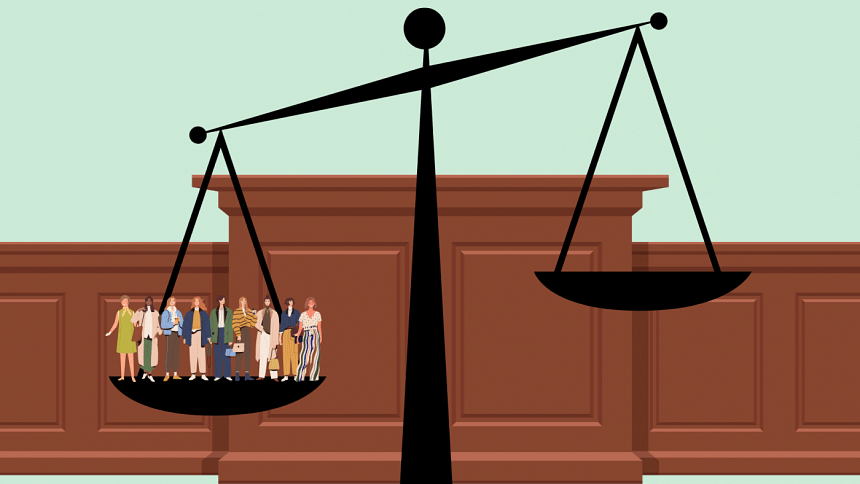Why the High Court’s comments on women’s clothing is objectionable

On August 17, the High Court challenged the validity of outrage over the harassment of a young woman for her attire at Narsingdi Railway Station earlier this year.
"(The young woman) was in an offensive position on the platform, as seen in the CD. Is it your right? Clothing rights?" the court questioned the attorney for the state during the hearing of an accused's bail application.
For context, on May 18, 2022, a female university student and two friends accompanying her were physically and verbally assaulted at Narsingdi Railway Station. Their vile and unjust humiliation was recorded and eventually posted on Facebook. The video led to widespread anger regarding the situation and subsequently, a case was filed and the accused were arrested.
The bail hearing in question was for Sheela, the woman who is accused of initiating the attack on the students. When Assistant Attorney General Syeda Zahida Sultana argued in opposition of the accused's bail application saying that a person has the right to dress as they please and cannot be harassed for this, the court asked her, "Do people not have the right to preserve their heritage, culture and tradition? Is clothing not a part of culture? The socioeconomic status of the society one is in should also be considered. Dhaka has one kind of environment and rural areas have their own."
While the Assistant Attorney General hit back with the correct idea that culture is ever-evolving, the court bench virtually paid no heed to her and granted Sheela interim bail for six months.
As a young woman living in this country, I find the High Court's attitude towards a woman's right to her own body – yes, the right to dress as per one's wish is an extension of bodily autonomy – heartbreaking and loathsome. Not only is this idea grounded on a very narrow-minded assumption that people who adhere to traditional norms are morally superior than others, it is also very misogynistic. After all, even though not directly stated, we can all tell that the court's statement is directed towards women. Because in this country, a man's choice to dress a certain way, at worst, can incite some rude comments. A woman's choice is obviously a different story altogether.
Either way, it is vital for people and organisations of power to understand that the right to choose how to dress is a personal freedom that should be available to everyone. It should not matter if their choices challenge traditions or a culture – a person's innate personal freedoms should always take precedence over society's expectations of them. As long as people do not internalise this state of mind, these brazen acts of violence and suppression of people's rights will continue and at this rate, worsen every time.
The truth is, the High Court's statement was not meant to reflect our cultural values. Whatever Bengali culture may be, it sure is not stagnant or inhumane. The court's statement was simply a poor defence of our inherently misogynistic society and broken legal system – a system that is historically blind to the effects of enabling perpetrators and deaf to the ever growing loud cries for a change. A system that, with its most recent blatantly ignorant remark, has failed us yet again.
Fabiha is secretly a Lannister noblewoman and a Slytherin alum. Pledge your allegiance and soul to her at [email protected]

 For all latest news, follow The Daily Star's Google News channel.
For all latest news, follow The Daily Star's Google News channel. 



Comments